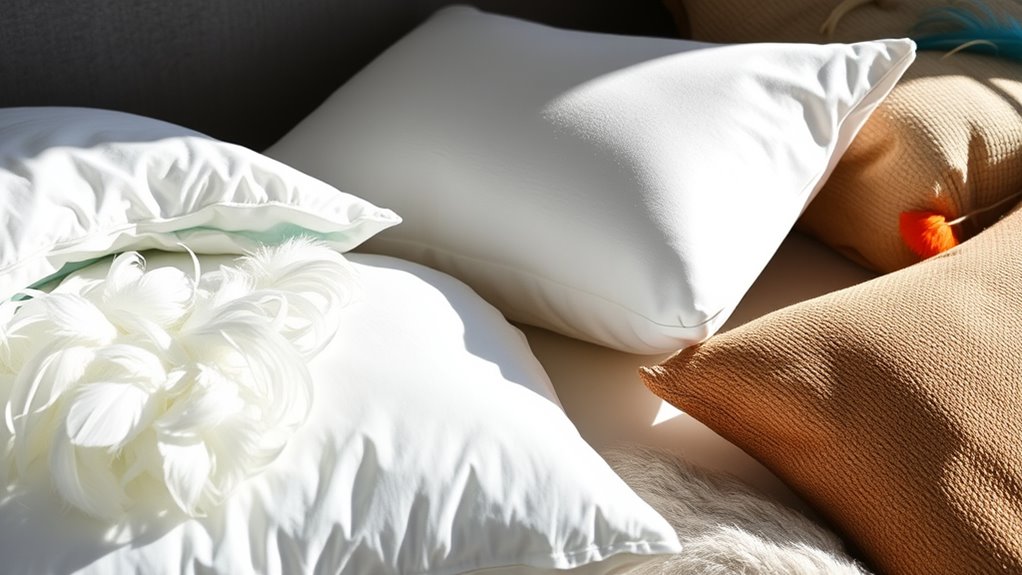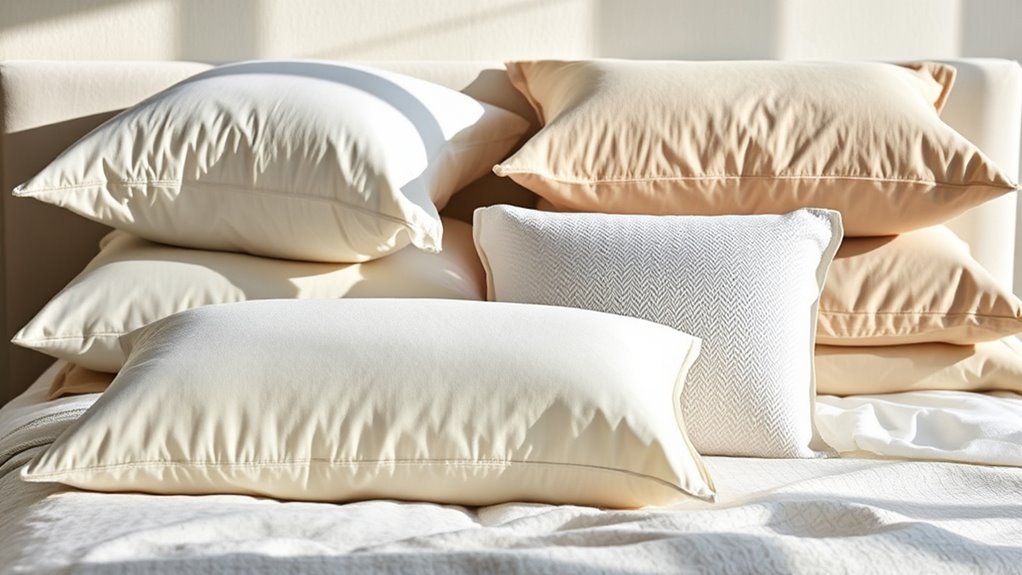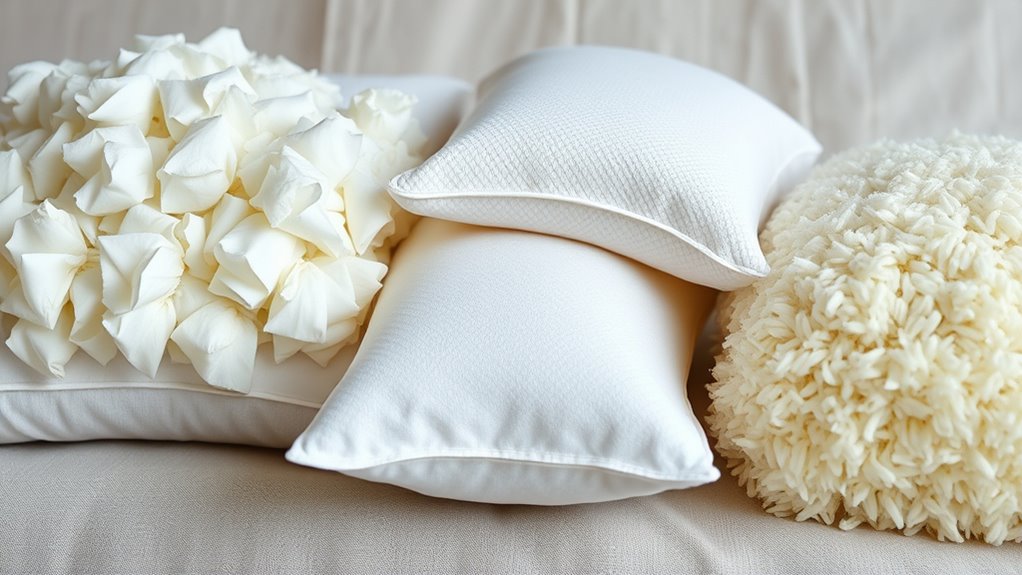Choosing the right pillow fill material is crucial for your comfort and sleep quality. Down pillows provide a luxurious feel but need regular fluffing. Feather pillows are more affordable yet might have quills that irritate. Memory foam offers contouring support, making it great for specific needs. Synthetic options are hypoallergenic but can retain heat. Consider your sleep position too, as it influences the support you need. There’s so much more to explore about finding your perfect pillow.
Key Takeaways
- Down Pillows: Provide luxurious softness and insulation but require regular fluffing and can trigger allergies in sensitive individuals.
- Feather Pillows: More affordable than down but may have quills that can cause discomfort; less insulation compared to down.
- Memory Foam Pillows: Offer contouring support and pressure relief, ideal for those needing specific neck and head support.
- Synthetic Fiber Pillows: Hypoallergenic and easy to maintain, but may retain heat, making them warmer for some sleepers.
- Water Pillows: Allow for customizable height and firmness, providing personalized support that can adapt to different sleep positions.
Types of Pillow Fillings

When it comes to choosing a pillow, the fill material plays a crucial role in your comfort and support.
Down pillows offer a luxurious feel with excellent insulation, but they need regular fluffing to maintain loft. Additionally, the soak method for watering large indoor plants can be likened to how down pillows need periodic attention to retain their shape. Glycolic acid can be beneficial for scalp health, similar to how proper pillow filling can enhance sleep quality. Moreover, the power of imagination can help you envision the ideal sleeping scenario that a quality pillow can provide. A well-supported head and neck are essential for overall comfort, much like how regular veterinary visits ensure a dog’s health and well-being.
Down pillows provide a plush experience and superior warmth, but remember to fluff them regularly for optimal loft.
Feather pillows are more affordable and provide good support, though some may find the quills uncomfortable.
If you prefer contouring, memory foam pillows offer exceptional support and pressure relief, though they can retain heat and feel too firm for some.
Synthetic fiber pillows, typically hypoallergenic and resistant to mold, are budget-friendly but may lack breathability.
For those seeking customizable loft and firmness, buckwheat hull pillows provide firm support and good airflow, although they can be noisy when moved. Your choice depends on your personal preferences! Additionally, color accuracy in pillow design can enhance your overall sleeping experience by providing visually appealing options.
Natural vs. Synthetic Fillings

Which type of pillow filling suits your needs best: natural or synthetic? Natural fillings like down pillows offer excellent breathability, temperature regulation, and durability, making them a luxurious choice. However, they may trigger allergies and require regular fluffing. On the other hand, synthetic fillings, such as memory foam, are often hypoallergenic and provide great support by conforming to your head and neck. They can be more affordable but may retain heat, leading to a warmer sleep experience. Additionally, incorporating mindfulness and presence through a comfortable pillow can enhance your overall sleep quality. Furthermore, using a pillow with improved air quality can also contribute to better sleep by reducing allergens in your sleeping environment. It is also important to consider long-term financial planning when investing in high-quality bedding products to ensure that they meet your needs for years to come. Practicing self-care routines can also help you choose the right pillow filling that contributes to restorative sleep and overall well-being. Moreover, investing in a quality pillow can be seen as part of your overall retirement savings plan for well-being, as a good night’s sleep is crucial for long-term health.
| Feature | Natural Fillings | Synthetic Fillings |
|---|---|---|
| Breathability | High | Moderate |
| Support | Soft and moldable | Firm and conforming |
| Durability | Longer-lasting | May clump or lose shape |
Best Pillow for Different Sleep Positions

Here are some guidelines for selecting the best pillow filling options:
- Side sleepers need firm or dual-layer pillows, often with memory foam, for neck support and spine alignment. Incorporating gentle stretching before bedtime can further enhance comfort and reduce tension in the neck and shoulders. Additionally, ensuring proper spine alignment is crucial to prevent discomfort throughout the night.
- Back sleepers benefit from softer pillows that gently cradle the head, using synthetic or memory foam fills to maintain ideal firmness. This helps to ensure proper spinal alignment, which is essential for restful sleep. Choosing a pillow that conforms to the head and neck can significantly improve sleep quality.
- Combination sleepers should opt for medium-height pillows, blending materials for versatile support across different positions. Incorporating ergonomic furniture into your sleep setup can also enhance overall comfort and support. Experimenting with various fills can help you find the perfect balance for your unique sleeping style.
Pillows for Allergy Sufferers

If you suffer from allergies, choosing the right pillow can considerably impact your sleep quality and overall health.
Opt for hypoallergenic pillows designed to resist dust mites, mold, and pet dander, ensuring a healthier sleeping environment. Look for pillows with anti-allergy certifications, like Nomite, which guarantee resistance to allergens. Additionally, consider pillows made from hypoallergenic breeds that can reduce allergy risks related to pets in your home. Using natural remedies such as specific pillow materials may help alleviate allergy symptoms as well. Engaging with Waldorf toys can also improve children’s emotional intelligence, providing a holistic approach to their development and well-being. Furthermore, choosing natural fillings like wool and latex can enhance the comfort of your sleep experience.
Choose hypoallergenic pillows with anti-allergy certifications to create a healthier sleeping environment free from dust mites and allergens.
Natural fillings such as wool and latex are preferable over synthetic options, as they tend to be more resistant to allergens. Steer clear of down and feather pillows, since they can harbor dust mites.
Regular washing and maintenance of your pillow can help reduce allergen accumulation, extending its lifespan and promoting a healthier sleeping environment. Additionally, seeking professional advice during your pillow selection process can further ensure you make an informed choice that supports your health.
Prioritize your comfort and health by making informed choices when selecting your pillow.
Specialty Pillow Options

When it comes to enhancing your sleep experience, specialty pillows can make a significant difference.
These pillows cater to specific needs, ensuring you wake up refreshed. Here are some options to evaluate:
- Orthopaedic pillows: Designed to support your neck and spine, perfect for alignment issues. Establishing clear rules for your sleep environment can help improve your overall rest. Research shows that similar to youth sports mentoring, finding the right support can enhance well-being. Additionally, ensuring that you have access to reliable resources on postpartum care can further improve your overall sleep quality during early parenthood.
- Cooling pillows: Utilize gel-infused memory foam or synthetic materials to regulate temperature, ideal for those with night sweats. Many parents find that a good night’s sleep is essential for managing newborn care routines effectively.
- Water pillows: Allow you to customize height and firmness by adjusting the water level, providing personalized support.
Choosing the right pillow can also positively impact your overall well-being, similar to how regular prenatal check-ups monitor fetal development during pregnancy.
Whether you prefer down, feather pillows, or a mix of filling types, specialty pillows can help address your unique sleep challenges, such as snoring or discomfort, leading to a better night’s rest.
Key Considerations When Choosing a Pillow

When you’re picking a pillow, think about your sleep position and how it affects the type of support you need.
Also, consider your allergies; choosing hypoallergenic materials can make a big difference in your comfort.
Finally, the filling type plays an essential role in how well the pillow suits your needs, so be sure to weigh your options carefully. Additionally, consider how suction power can impact your overall comfort by ensuring proper support for your neck and spine alignment.
Filling Type Importance
Choosing the right pillow fill type is essential for achieving a restful night’s sleep, as it directly influences your comfort and support. The filling you choose affects sleep quality and personal preferences, so consider the following:
- Down pillows provide luxurious softness but need regular fluffing for loft.
- Memory foam offers excellent support and pressure relief, conforming to your head and neck.
- Synthetic pillows are hypoallergenic and easier to maintain, though they may lack breathability.
Understanding these factors helps you select the perfect pillow filling.
If you’re a side sleeper, opt for firmer fills for alignment, while back and stomach sleepers might prefer softer options for comfort.
Make your choice based on what’ll give you the best support throughout the night.
Sleep Position Compatibility
Understanding your sleep position is essential for selecting the right pillow, as it directly impacts your comfort and spinal alignment.
For side sleepers, firmer, higher pillows made from down/feather blends provide the necessary support to maintain alignment.
Back sleepers typically benefit from medium-firmness pillows, like memory foam, which contour to the neck’s natural curve.
If you’re a front sleeper, opt for soft, thin pillows to minimize neck strain.
Combination sleepers may find versatility in medium-height pillows that mix fillings, accommodating various positions throughout the night.
Generally, one well-chosen pillow suffices for most sleepers; multiple pillows can signal a need for better support.
Prioritize sleep position compatibility when selecting your ideal pillow type for maximum rest.
Allergies and Sensitivities
If you have allergies or sensitivities, selecting the right pillow material is essential for your comfort and health. Opting for hypoallergenic options can greatly reduce allergy triggers.
Here are some key considerations:
- Choose natural fillings like wool or latex, which resist dust mites and are generally hypoallergenic.
- Look for synthetic fillings like microfiber that offer anti-allergy certifications, ensuring allergen minimization.
- Avoid materials such as down and feathers if you know they provoke your allergies.
Regularly washing your pillows and using protective covers can enhance sleep hygiene, helping you breathe easier at night.
Recommended Pillowcases

When it comes to selecting pillowcases, opting for natural fabrics like Egyptian cotton, linen, or silk can greatly enhance your sleep experience.
These materials provide excellent comfort and breathability, ensuring a restful night. For sensitive sleepers, pillowcases with moisture-wicking and antimicrobial properties are essential, helping to resist allergens and improve sleep quality.
Natural fabrics enhance comfort and breathability, while moisture-wicking and antimicrobial properties support sensitive sleepers for improved sleep quality.
Always choose pillowcases that fit your pillow size and shape to guarantee proper coverage and support. A high thread count adds softness and durability, contributing to overall comfort.
Don’t forget to wash your pillowcases regularly to maintain hygiene and prolong the life of both the pillow and pillowcase.
Frequently Asked Questions
Are Synthetic or Feather Pillows Better?
When deciding between synthetic and feather pillows, consider your personal needs.
If you suffer from allergies, synthetic pillows might be your best bet since they’re hypoallergenic and resistant to dust mites.
On the other hand, if you value luxurious softness and breathability, feather pillows may appeal to you, though they can require more maintenance.
Ultimately, it’s about what feels comfortable and suits your sleeping habits best.
Make your choice based on that!
What Is the Best Fill Material for a Pillow?
When it comes to finding the best fill material for your pillow, it really depends on your personal comfort and sleep style.
If you love softness, you might prefer down or synthetic. For firm support, consider memory foam or latex.
Think about your allergies too; hypoallergenic options like synthetic or latex can be great.
Ultimately, test a few types to see which one feels just right for you during the night.
Which Is Better, Memory Foam or Feather Pillow?
When deciding between a memory foam pillow and a feather pillow, consider your sleep needs.
If you need contouring support and pressure relief, memory foam’s got you covered. If you prefer softness and better breathability, a feather pillow’s your friend.
While memory foam lasts longer, feather pillows are lighter and easier to adjust.
Ultimately, think about your comfort preferences and sleeping habits to choose the right one for you.
What Should I Look for in a Memory Foam Pillow?
When you’re looking for a memory foam pillow, focus on the density for ideal support. Higher density pillows conform better to your shape and last longer.
Check for cooling features, like gel-infused foam, to prevent overheating. A removable, machine-washable cover made from breathable materials is essential for hygiene.
Don’t forget to take into account loft and firmness; medium-firm options often help maintain proper spinal alignment, especially if you sleep on your back or side.
Conclusion
Choosing the right pillow fill can make a world of difference in your sleep quality. With options like down, feather, memory foam, and synthetic materials, it’s all about finding what suits your needs best. Are you ready to experience the comfort that comes from the perfect pillow? Remember to take into account your sleep position, allergies, and personal preferences as you make your selection. With the right pillow, you’ll wake up refreshed and ready to tackle the day!









